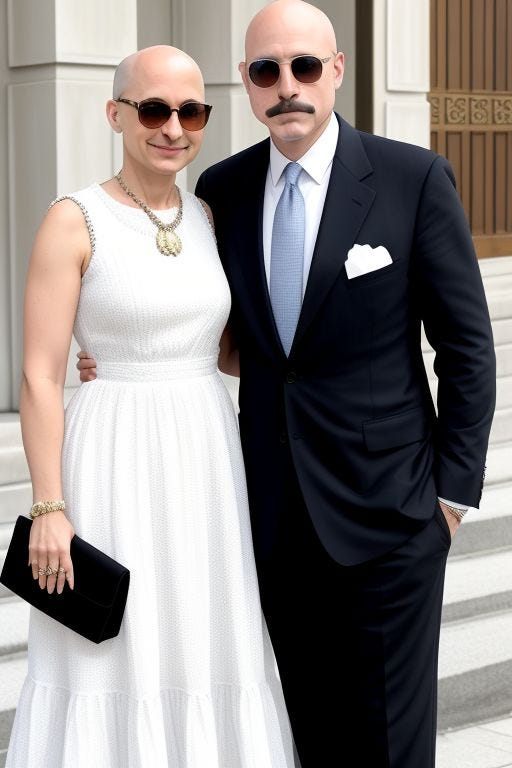Stable diffusion gave me a norwood wife
I had scheduled this article to automatically publish last month but evidently failed, so the subject-matter is somewhat stale. The article is boring and was boring to write but at the time I thought it was worth putting together.
Given the traditionalist sexuality wars raging on twitter, and given that I’ve been asked in private about the subject and received hostile interrogatory comments from self-described gay readers, I wanted to add my own perspective to the mix. I also wanted to provide an example of how I think Americans should be able to speak about a controversial, identity-adjacent subject without fear of reprisal at work or in the public sphere.
Below is how I, a non-expert, non-scientist, ordinary American adult thinks about sexual conservatism. I’ve surveyed some of the literature and drawn the following conclusions.
I’ll note, by the way, that the reproach of “you’re not an expert” is no longer effective in the realm of sexuality, let alone any other publicly-debated policy sphere. Sexual identitarians long ago surrendered that rebuke when they began predicating policy upon scientific research. Today every policy proposal is buttressed by an array of impressive sounding journal abstracts, which you’ll find being thrown about on reddit and in congressional hearings; and yet the policy-makers/advocates offering the research are themselves non-experts. Thus, it’s reasonable to conclude that ordinary non-expert discourse on social policy can be informed by the same kind of half-assed journal abstract-based philosophy that undergirds contemporary legislation and HR policy.
The primary concern behind the raging conflict on twitter (now known as X) seems to be sexual libertinism manifested in the form of heterosexual promiscuity, but also in minority abnormal sexual behavior like homosexuality and transgenderism. These concerns flow into the concerns about pedophilia and human trafficking raised by recent scandals like Pizzagate, Harvey Weinstein and the Me Too movement, as well as Epstein’s human trafficking ring.
I won’t advance religious justifications deriving from scripture, not because I am not persuaded by scripture but because we live in a secular society without shared religious convictions to which one can legitimately appeal in bounded discourse. Social conservatism advocates demonstrate their misunderstanding of the American Civil Religion when they try to justify policy by invoking laws revealed to man by God and formalized in ancient scripture. Social conservatives are on firmer ground when they appeal to religious natural law philosophies. Sexual liberals rely upon similar natural law arguments like “born this way” but are not averse to digging up statistics and other studies to show the positive utilitarian benefits of their positions.
For reasons obscure to me, conservative policymakers are far more averse to taking the latter approach, notwithstanding the wealth of conservative sociological research on the subject. I personally find the pragmatic, non-religious basis for sexual conservatism to be persuasive, subject to the conditions I’ll set out below. This doesn’t mean that the Revelation basis should not be invoked, however. Even from a purely utilitarian perspective, it is worth pointing out that many modern religions have long histories of sexual conservatism, suggesting that in some sense sexual conservatism is a salutary adaptation for large communities.
It also means that sexual conservatism can persuasively be endorsed without recourse to Abrahamic scripture. We know this from ancient pagan sources.
The non-Judaean ancient Mediterranean literature is maddeningly inconsistent on sexual mores and the corresponding contemporary scholarship is mired in issues like distinctions between pederasty and adult homosexuality, passive and active roles in sex acts, and in disputes over whether ancient commentators were being politically correct or “exoteric”. In general, libertine sexuality in antiquity doesn’t seem to have been a taboo in the Victorian sense that you had to invent euphemisms and risk your reputation or freedom to engage in various extra-marital sexual behaviors.
But while orgiastic and Dionysian practices and rituals persisted, there were corresponding sexual conservativism movements that emerged long before the influence of Judaean mores spread to ruling class religiosity. For example, respectable Roman Republican families were supposed to punish female children for participating in bacchanals, and the pagan Roman senate struggled for decades to ban the rituals.
Outside of religious-scriptural justifications for social conservatism, most modern arguments in favor of sexually conservative customs and institutions have come from libertarians. This seems strange upon first impression because libertarianism tends to attract sexual libertines. The word itself further suggests a connection to the libertinism of decadent aristocrats like de Sade. The libertarian tradition mostly informs my position on sex policy.
What follows is a sketch of how I think about the subject within the confines of American political and civic life.



